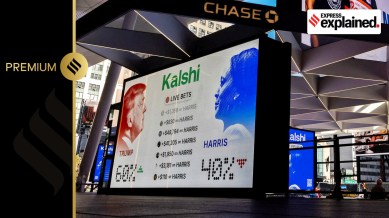Why US dailies endorse candidates; why Washington Post, LA Times broke with tradition
US elections 2024: This is the first time since 1988 that The Post will not endorse any candidate. The LA Times made no endorsements from 1976-2004, but resumed the practice in 2008.

The chief executive and publisher of The Washington Post, Will Lewis, announced on Friday that the newspaper would not endorse a candidate for president in the November 5 election and future elections.
The editorial board of The Post had already drafted an endorsement of Vice President Kamala Harris at the time. The decision to change the newspaper’s policy of endorsing a presidential candidate was made by its owner Jeff Bezos, American media, including The New York Times, reported.
Days earlier, The Los Angeles Times too, had decided to not endorse a candidate. This is the first time since 1988 that The Post will not endorse any candidate. The LA Times made no endorsements from 1976-2004, but resumed the practice in 2008.
What does a newspaper’s endorsement for a presidential candidate mean?
The tradition of newspaper editorial pages endorsing presidential candidates in the US is well over a century old. On October 11, 1860, The New York Times endorsed Abraham Lincoln, who went on to serve as the 16th President from 1861-65.
Newspapers seek to encourage informed voting by endorsing the candidate they believe would best lead on key issues affecting their readers.
An endorsement does not mean that the newspaper is campaigning for the candidate. The newspaper would continue to uphold journalistic ethics, and to provide fair and unbiased coverage. This is one of the reasons why many newspapers have separate editorial boards that handle opinions and endorsements, and are distinct from news teams.
In India, the tradition of endorsing does not exist. Although newspapers and TV channels may cover a candidate or party favourably, they do not officially endorse them.
Candidates endorsed by newspapers in the US have not always won. In 1897, almost all New York newspapers backed the losing candidates, according to a report by The NYT. However, in almost all presidential elections from 1940 to 2016, the candidate who received the most newspaper endorsements did enter the White House.
On what basis do newspapers endorse US presidential candidates?
Kathleen Kingsbury, the former Opinion Editor of The NYT, told the newspaper in 2020 that several considerations are kept in mind: how would a candidate perform in office; do they have a blueprint to accomplish the goals they have set; etc. “Whose platform and record are most consistent with our values? Whose temperament and character are best suited to the demands of the presidency? Who can be the most effective president in today’s polarised political climate?” Kingsbury said.
Why did The Post and The LA Times not endorse a candidate?
In an opinion piece in The Post, Lewis wrote the newspaper was “returning to our roots of not endorsing presidential candidates”. He cited The Post’s decision to not publish an endorsement in the 1960 race between John F Kennedy and Richard Nixon. However, the newspaper did throw its weight behind Dwight D Eisenhower in 1952, and endorsed Jimmy Carter in 1976. Both Eisenhower, a Republican, and Carter, a Democrat, won.
The LA Times’ owner Patrick Soon-Shiong said in an interview with the newspaper that not offering an endorsement would be less divisive in a tumultuous election.
“The process was [to decide]: how do we actually best inform our readers? And there could be nobody better than us who try to sift the facts from fiction”, while leaving it to readers to make their own final decision, he said.
The decisions to not endorse have angered staff at both newspapers — The Washington Post Guild and The Los Angeles Times Guild have expressed concern over their owners’ decisions.
Robert Kagan, editor at large at The Post, and the editorials editor at The LA Times, Mariel Garza, have resigned in protest. Legendary Post reporters Bob Woodward and Carl Bernstein said in a statement that “this decision…ignores The Washington Post’s own overwhelming reportorial evidence on the threat Donald Trump poses to democracy”.
Why have the decisions of The Post and The LA Times been criticised?
Trump is among the most polarising figures in US political history, whose views and actions have left Americans deeply divided. In their rhetoric, both Democrats and Republicans have predicted the end of the US and of American values if the nominee of the other side enters the White House next year. Since 2016, when he won the first time, Trump has been intensely hostile to criticism in the media, and has repeatedly denounced newspapers such as The New York Times and The Washington Post as “fake news”.
Critics of the decisions have alleged that Bezos and Soon-Shiong have business reasons to not annoy Trump, who polls suggest has a 50-50 chance of victory. Bezos’s company Amazon has billions of dollars in cloud computing contracts with the US federal government, and Blue Origin, his rocket company, has contracts with the Space Force and NASA. Amazon also faces an antitrust lawsuit that the Biden administration brought in 2023.
Soon-Shiong made his fortune as a biopharma innovator, and is currently working on new drugs that would require US Food and Drug Administration (FDA) approval, a report in the Columbia Journalism Review said.